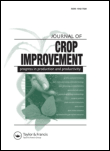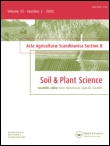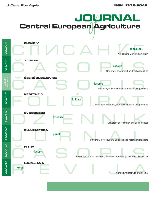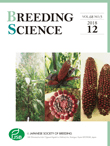
Journal of Crop Improvement
Scope & Guideline
Nurturing the next generation of crop improvement strategies.
Introduction
Aims and Scopes
- Crop Genetic Improvement:
Research on genetic diversity, molecular markers, and breeding techniques aimed at enhancing the genetic potential of various crops. - Plant Breeding Techniques:
Exploration of traditional and modern breeding methods, including marker-assisted selection and transgenic approaches to develop superior crop varieties. - Crop Management Practices:
Studies focusing on agronomic practices, soil management, and the impact of environmental factors on crop productivity. - Resistance Mechanisms:
Investigations into plant-pathogen interactions and the genetic basis for resistance to diseases and pests in various crops. - Sustainable Agriculture:
Research emphasizing sustainable practices and technologies that improve crop resilience and productivity while minimizing environmental impact. - Technological Innovations:
Application of modern technologies such as nanotechnology, machine learning, and precision agriculture to enhance crop management and breeding.
Trending and Emerging
- Molecular Breeding and Genomic Tools:
An increasing number of papers are focusing on molecular breeding techniques and genomic tools, reflecting a trend towards precision agriculture and the use of genomic data in crop improvement. - Climate Resilience and Adaptation Strategies:
Research addressing climate change impacts on crop production and the development of climate-resilient varieties is becoming prominent, highlighting the urgency of adapting agriculture to changing environmental conditions. - Smart Agriculture Technologies:
The application of smart technologies, such as IoT and machine learning for crop management and disease prediction, is emerging as a key theme, showcasing innovation in data-driven agricultural practices. - Nutrient Management and Soil Health:
There is a growing emphasis on studies related to soil health and nutrient management practices, reflecting an understanding of their critical role in sustainable crop production. - Biotechnology and Genetic Engineering:
Papers exploring genetic modification and biotechnological advancements for crop improvement are on the rise, indicating a trend towards more innovative and effective breeding strategies.
Declining or Waning
- Traditional Crop Varieties:
There has been a noticeable decrease in studies focusing on traditional or heirloom varieties, as the emphasis shifts towards modern breeding techniques and genetically enhanced crops. - Non-scientific Agricultural Practices:
Research related to non-scientific or anecdotal agricultural practices has waned, as the journal increasingly prioritizes evidence-based methodologies and scientific rigor. - Generalized Crop Studies:
The trend is moving away from broad, non-specific crop studies towards more focused research that addresses specific challenges or innovations in crop improvement. - Biopesticides and Organic Approaches:
While still relevant, the exploration of biopesticides and organic farming techniques has seen a decrease as the journal emphasizes high-tech solutions and genetic improvements.
Similar Journals

CEREAL RESEARCH COMMUNICATIONS
Connecting scholars to elevate cereal science.Cereal Research Communications is a premier academic journal published by Springer Heidelberg, dedicated to advancing knowledge in the field of agri-food science with a particular focus on agronomy, crop science, genetics, and physiology. With a strong reputation reflected in its Q2 ranking in Agronomy and Crop Science, this journal serves as a vital resource for researchers, professionals, and students alike. Published in Hungary, the journal facilitates the dissemination of innovative research and practice, covering a broad spectrum from crop genetics to physiological processes, thereby fostering a multidisciplinary dialogue among scholars. The journal has maintained a consistent publication record since its inception in 1993 and will continue its commitment to academic excellence and relevance through 2024. Although it operates under a subscription model, its contributions are crucial for those engaged in improving crop productivity and sustainability. For those looking to connect with cutting-edge research and contribute to the food security dialogue, Cereal Research Communications remains an essential platform in the field.

ACTA AGRICULTURAE SCANDINAVICA SECTION B-SOIL AND PLANT SCIENCE
Pioneering Insights into Soil-Plant Dynamics and Agricultural SustainabilityACTA AGRICULTURAE SCANDINAVICA SECTION B-SOIL AND PLANT SCIENCE, published by Taylor & Francis AS, is a distinguished journal dedicated to the fields of Agronomy, Crop Science, and Soil Science. With an impressive impact factor, and categorized in Q2 for both Agronomy and Crop Science and Soil Science as of 2023, this journal is an essential resource for researchers, professionals, and students aiming to advance their understanding of soil-plant interactions and sustainable agricultural practices. Operating since 1992 and continuing through to 2024, ACTA aims to publish high-quality, peer-reviewed research that encourages the applicability of advanced scientific knowledge in real-world agricultural settings. While the journal is not open access, it remains widely accessible through institutional subscriptions, reflecting its commitment to disseminating essential findings and fostering innovation in soil and plant science worldwide. Nestled in the vibrant academic environment of Norway, ACTA AGRICULTURAE SCANDINAVICA serves as a key platform for nurturing groundbreaking research that informs sustainable agricultural policies and practices globally.

CROP SCIENCE
Advancing sustainable agriculture through innovative research.CROP SCIENCE, published by WILEY, is a premier journal dedicated to the field of agronomy and crop science, offering a platform for high-quality research on crop production, genetics, and sustainable agricultural practices. With an impactful presence since its inception in 1974, the journal has become a significant contributor to advancing knowledge in this critical field, as evidenced by its Q2 ranking in the 2023 categorizations and a Scopus rank in the 72nd percentile among its peers. The journal's aim is to disseminate innovative research findings that inform best practices and policies for enhancing crop yield and sustainability, making it an essential resource for researchers, professionals, and students alike. Although CROP SCIENCE does not currently offer open access options, the journal’s extensive readership and reputation make it a valuable asset for anyone invested in the future of agriculture.

CANADIAN JOURNAL OF PLANT SCIENCE
Fostering Collaboration in Plant Research ExcellenceCanadian Journal of Plant Science (ISSN: 0008-4220, E-ISSN: 1918-1833) is a prestigious publication dedicated to advancing research in the fields of agronomy, horticulture, and plant science. Published by Canadian Science Publishing, this journal has been a cornerstone in the Canadian and international scientific community since its inception in 1973. With a solid presence in reputable databases, it ranks in the Q3 category for multiple disciplines as of 2023, reflecting its impact and relevance within the agricultural sciences. The journal serves as a vital resource for researchers, professionals, and students, encouraging the dissemination of innovative findings and fostering collaboration across disciplines. Although it is not an open-access journal, subscribers gain exclusive access to a wealth of knowledge, with articles aiming to enhance the understanding of plant systems and contribute to sustainable agricultural practices. The Canadian Journal of Plant Science remains committed to supporting the growth of plant-related research and its practical applications in today's changing environmental landscape.

Egyptian Journal of Agronomy
Empowering Agronomists with Insightful ResearchEgyptian Journal of Agronomy, published by the NATL INFORMATION DOCUMENTATION CENT, ACAD SCIENTIFIC RESEARCH & TECHNOLOGY, serves as a pivotal platform for researchers, professionals, and students focusing on various disciplines within the agricultural sciences, including agronomy, soil science, horticulture, and ecology. With an ISSN of 0379-3575 and E-ISSN of 2357-0288, the journal aims to bridge the gap in knowledge and innovation in the field with its comprehensive studies and frameworks. While the journal is currently categorized in low Scopus ranks, indicating immense potential for growth in influence and impact, it remains dedicated to providing quality research and fostering advancements in agronomic practices. Set in Egypt, a hub for agricultural research, the journal is committed to reflecting the regional and global challenges in agriculture. The Egyptian Journal of Agronomy is a vital resource for anyone engaged in the evolving landscape of agricultural science, offering insights that promote sustainable practices and address current issues facing the sector.

Revista Fitotecnia Mexicana
Cultivating Innovations in Agronomy and Crop ScienceRevista Fitotecnia Mexicana is a prominent academic journal published by the SOC MEXICANA FITOGENETICA, dedicated to advancing knowledge in the fields of agronomy, crop science, genetics, horticulture, and plant science. With its establishment dating back to 2007 and currently running through 2024, this journal serves as an important platform for researchers, professionals, and academic institutions interested in plant genetic resources and agricultural innovations. Although it holds a Q4 quartile ranking in various categories and is positioned within the lower percentiles in Scopus rankings, it provides crucial insights and opportunities for emerging ideas and local research initiatives. Based in Mexico, and with its indexed ISSN 0187-7380, the journal plays an important role in stemming from the rich agricultural heritage of the region. The lack of open access options underscores the depth of curated content provided, making it a valuable resource for professionals seeking to expand their expertise in the sector.

Journal of Central European Agriculture
Pioneering Research for Global Agricultural SolutionsThe Journal of Central European Agriculture, with ISSN 1332-9049 and E-ISSN 1332-9049, is an esteemed platform published by UNIV ZAGREB, FAC AGRICULTURE that caters to the dynamic fields of agronomy, crop science, and animal science. Since its establishment in 2000, this Open Access journal has played a crucial role in disseminating critical research findings while fostering collaboration among academics, researchers, and professionals within the agricultural community. The journal, which is based in the heart of Croatia, spans a rich history of scholarship, with its content available for free to readers and contributors alike. As reflected in its current standings, the journal has achieved a Quartile 3 ranking in Agronomy and Crop Science and Quartile 4 in Animal Science and Zoology for the year 2023, indicating its growing influence within these disciplines. With Scopus ranks placing it in the 32nd percentile among its peers, the Journal of Central European Agriculture is committed to advancing agricultural sciences not only in Central Europe but globally as it prepares for its converged years from 2007 through 2024. This journal serves as a vital resource for innovative research, practical applications, and a deeper understanding of agricultural challenges and solutions.

MOLECULAR BREEDING
Elevating Science with Cutting-Edge Genetic ResearchMOLECULAR BREEDING is a prestigious journal published by Springer, dedicated to advancing the field of agronomy, plant science, and biotechnology through innovative research contributions. With an impressive ISSN of 1380-3743 and E-ISSN 1572-9788, this journal has continuously served the scientific community since its inception in 1995. Operating from the Netherlands, MOLECULAR BREEDING is recognized for its high impact factor and status in the Q1 quartile for both Agronomy and Crop Science and Plant Science in the latest 2023 metrics, highlighting its influential role in these domains. With strong Scopus rankings reflecting its position within the top percentiles of various related fields—including a notable 81st percentile in Plant Science—this journal is essential for researchers, professionals, and students striving to understand and innovate in molecular genetics and breeding techniques. Although it does not provide open access, its rigorous peer-review process ensures that published articles maintain the highest standards and contribute significantly to the scientific discourse. The journal’s diverse scope encompasses significant advancements in molecular biology and genetics, ultimately supporting the global objectives of sustainable agriculture and enhanced crop resilience.

POTATO RESEARCH
Elevating food security through potato research.POTATO RESEARCH is a prestigious journal dedicated to advancing the scientific understanding of potato cultivation and its wider implications in the fields of agronomy, crop science, and food science. Published by Springer in the Netherlands, this journal boasts an impressive impact factor and ranks in the Q2 category for both Agronomy and Crop Science, as well as Food Science in 2023, affirming its significant contribution to these disciplines. With over five decades of research converged from 1970 to 2024, POTATO RESEARCH serves as a vital platform for researchers, professionals, and students interested in the latest findings and innovations that affect potato production and processing. Although it is not an open-access journal, it remains a crucial resource for those dedicated to enhancing agricultural sustainability and food security. For inquiries or submission details, please refer to their office located at Van Godewijckstraat 30, 3311 GZ Dordrecht, Netherlands.

BREEDING SCIENCE
Advancing the Future of Agronomy and GeneticsBREEDING SCIENCE is a premier journal published by the Japanese Society of Breeding, dedicated to the advancement of knowledge in the disciplines of agronomy, plant science, and genetics. Established in 1993, this influential publication has consistently contributed to the global research community, showcasing high-quality studies that intersect innovative breeding techniques with pressing agricultural challenges. With an esteemed Scopus rank placing it in the top quartile of Agronomy and Crop Science and the second quartile in Plant Science, BREEDING SCIENCE is essential reading for researchers, professionals, and students alike. The journal's reach and rigor are evidenced by its significant presence in leading academic databases, providing insights and advancements that are critical for improved crop production and sustainable practices. Although it does not currently offer open access options, the depth and relevance of its content ensure that it remains a vital resource for those committed to exploring the evolution and impact of breeding science. For further information, readers are encouraged to connect directly with the journal via its administrative office located at the University of Tokyo's Graduate School of Agricultural and Life Sciences.